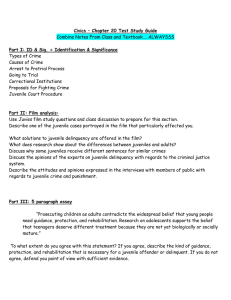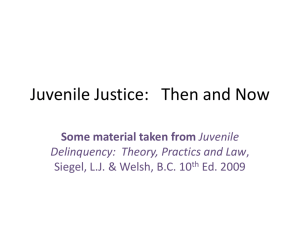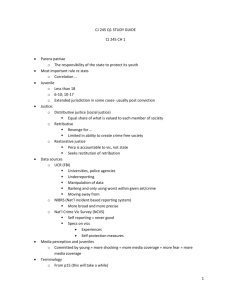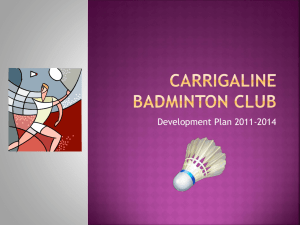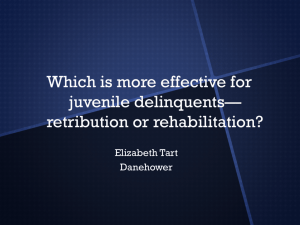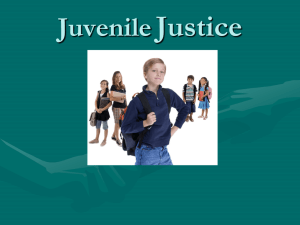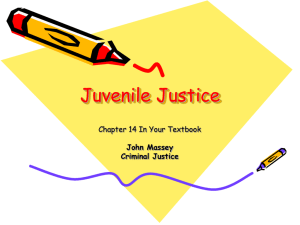ADJ 105 Fall 2013 - NOVA Blogs - Northern Virginia Community
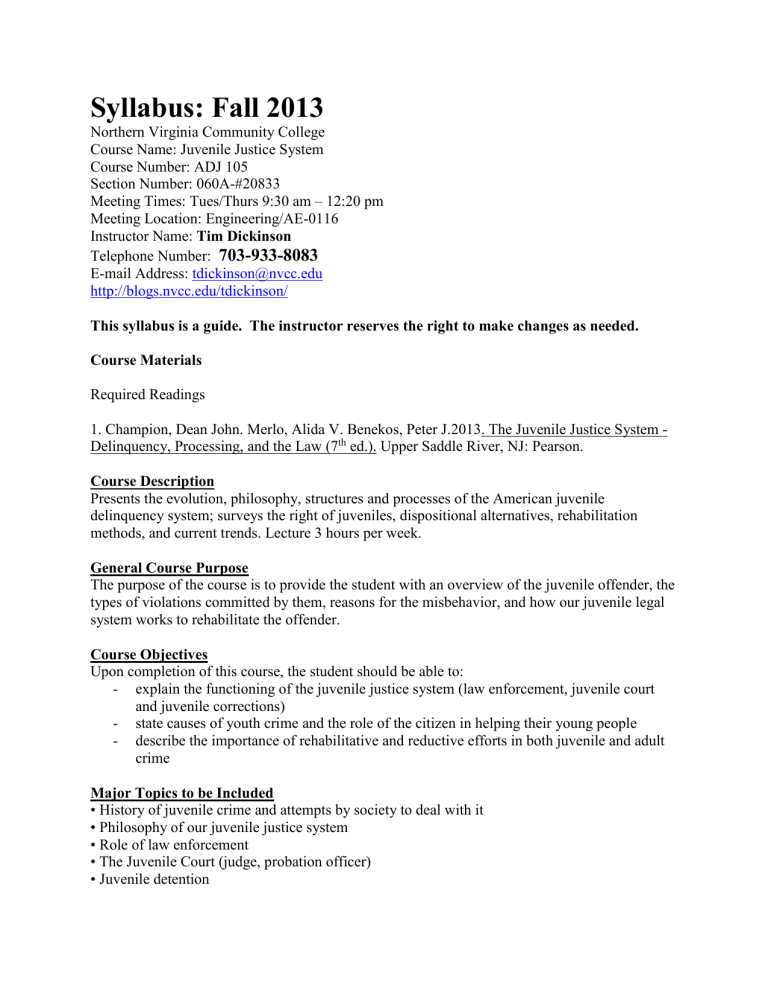
Syllabus: Fall 2013
Northern Virginia Community College
Course Name: Juvenile Justice System
Course Number: ADJ 105
Section Number: 060A-#20833
Meeting Times: Tues/Thurs 9:30 am – 12:20 pm
Meeting Location: Engineering/AE-0116
Instructor Name: Tim Dickinson
Telephone Number: 703-933-8083
E-mail Address: tdickinson@nvcc.edu
http://blogs.nvcc.edu/tdickinson/
This syllabus is a guide. The instructor reserves the right to make changes as needed.
Course Materials
Required Readings
1. Champion, Dean John. Merlo, Alida V. Benekos, Peter J.2013. The Juvenile Justice System -
Delinquency, Processing, and the Law (7 th
ed.). Upper Saddle River, NJ: Pearson.
Course Description
Presents the evolution, philosophy, structures and processes of the American juvenile delinquency system; surveys the right of juveniles, dispositional alternatives, rehabilitation methods, and current trends. Lecture 3 hours per week.
General Course Purpose
The purpose of the course is to provide the student with an overview of the juvenile offender, the types of violations committed by them, reasons for the misbehavior, and how our juvenile legal system works to rehabilitate the offender.
Course Objectives
Upon completion of this course, the student should be able to:
explain the functioning of the juvenile justice system (law enforcement, juvenile court and juvenile corrections)
state causes of youth crime and the role of the citizen in helping their young people
- describe the importance of rehabilitative and reductive efforts in both juvenile and adult crime
Major Topics to be Included
• History of juvenile crime and attempts by society to deal with it
• Philosophy of our juvenile justice system
• Role of law enforcement
• The Juvenile Court (judge, probation officer)
• Juvenile detention
• Crime causation theories
• Child abuse
• Runaways
• Child pornography
• Supreme Court decisions and their impact
• Constitutional rights of juveniles
• Youth gangs
• Peer group influences
• Family responsibilities
Course Requirements and Grading
Four Examinations (300 points total – lowest exam grade dropped)
Attendance and Participation (100 points)
Grading Scale
100%-90% - A
89%-80 – B
69%-60% - D
Below 60 - F
79%-70% - C
Description of Course Requirements
Examinations
There will be four examinations. I will drop the lowest test grade.
Examinations may consist of true/false, multiple choice, fill-in the blank and essay questions. There will be a maximum of
50 questions per examination and the examination will cover materials presented during lectures and from the textbook. Study guides will be provided.
There will be absolutely no make–up or early exams. Failure to take the exam when scheduled will result in the grade of “0” for the missed exam. That missed exam will constitute the
“dropped” exam.
There will be no opportunity for extra credit assignments so it is important that you satisfy the stated requirements.
Attendance and Participation
Attendance for each class is required. One-hundred points of your final grade is based on your attendance and participation in the class. Each missed class will result in a seven (7) point deduction from the attendance grade (100 points).
Attendance for each class is required. I usually take attendance at the beginning and end of each class. Each half of class is worth 4 points. If you are late, or leave early you will lose 4 points. I will make a determination for any attendance/participation points earned each class.
Read the textbook before class, and be prepared to ask and answer questions. If you attended class and participate, there is good chance the 89 (B) will become a 90 (A).
Policies and Procedures
Classroom civility – students are expected to respect each other and the instructor. Students should not disrupt class by arriving late, leaving early and/or by unnecessary talking or use of electronic devices. Students may be asked to leave class for any disruptions.
Should you choose to bring a laptop/tablet/smart phone to class it must only be used for course activities.
When in class please do not sleep , write notes to each other, read newspapers, do homework for any class, listen to music, or engage in activity that may disturb others.
Please turn your phone on vibrate!!
Fire/Emergency Evacuation Procedures : The evacuation route is located on the wall next to the classroom door. Please familiarize yourself with this route. In case of an emergency, take all of your belongings with you when/if possible.
Inclement Weather and Other Closing Information
: Please check NOVA’s website
(www.nvcc.edu) for information about weather closings and if class is cancelled, check
Blackboard for assignment information. Students are strongly encouraged to sign up for NOVA
Alert: https://alert.nvcc.edu/index.php?CCheck=1 .
Special Accommodations : Any student who thinks that he or she might need an accommodation based on a disability should make an appointment to see a Counselor for Disability Services
(Bisdorf Room 193). Additional information can be found here: http://www.nvcc.edu/currentstudents/disability-services/index.html
.
* Students are urged to contact the instructor with any special circumstances.
Office Hours:
Room - Bisdorf #352
Wednesday: 3:30 pm – 8:30 pm and
By Appointment: Monday 10 am – Noon
Wednesday 9am – Noon or see me before or after class for an appointment.
Important Dates:
Classes begin August 21
Schedule adjustments (add/drop/swap) on NOVAConnect (open to all)
Drops on NOVAConnect with tuition refund
August 21–25
August 21–29
Late schedule additions (in-person), permission required
Last day to drop with tuition refund or change to audit (census date)*
Last day to withdraw without grade penalty
Classes and examinations end
Course of Study
August 22
August 27
August 29
Sept 3
Sept 5
Sept 10
Sept 12
Sept 17
Sept 19
Sept 24
Sept 26
October 1
October 3
October 8
October 10
Course Orientation
Exam 1 Chapters (1-3)
Legal Rights of Juveniles
Exam 2 Chapters (4-6)
Prosecutorial Decisions
Exam 3 Chapters (7-9)
Guest Speaker
Overview of the Juvenile Justice System
History of Juvenile Justice System
Theories
Juveniles and Police
Nominal Sanctions
Juvenile Probation
Juvenile Corrections
Intake and Preadjudicatory Processing
Classification and Preliminary Treatment
The Adjudicatory Process
Exam 4 Chapters (10-12)
August 26–29
August 29
September 22
October 13
TOPIC /READINGS
Chapter 1
Chapter 2
Chapter 3
Chapter 4
Chapter 5
Chapter 6
Chapter 7
Chapter 8
Chapter 9
Chapter 10
Chapter 11
Chapter 12
